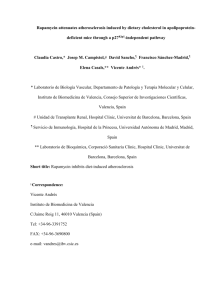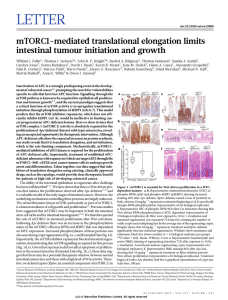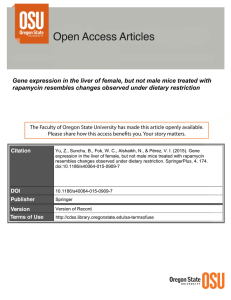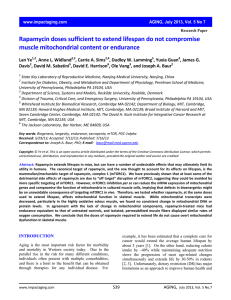“`Dirty` Cancer Fighter: Medicine`s Next Big Thing?” Tyler Curiel, MD
advertisement
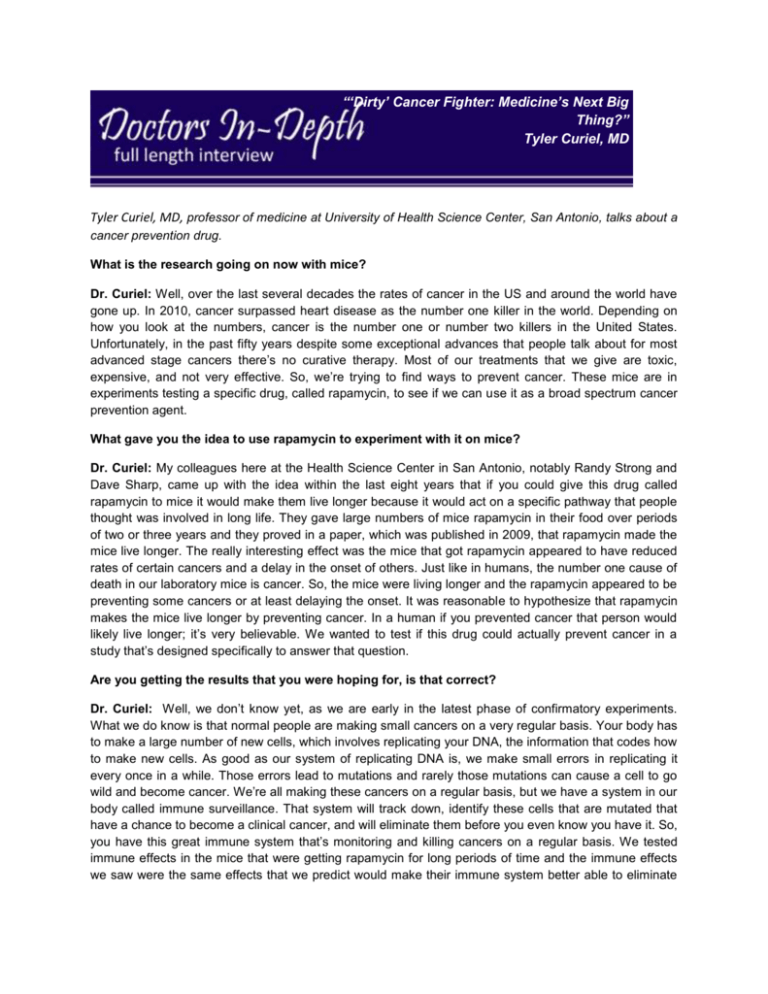
“‘Dirty’ Cancer Fighter: Medicine’s Next Big Thing?” Tyler Curiel, MD Tyler Curiel, MD, professor of medicine at University of Health Science Center, San Antonio, talks about a cancer prevention drug. What is the research going on now with mice? Dr. Curiel: Well, over the last several decades the rates of cancer in the US and around the world have gone up. In 2010, cancer surpassed heart disease as the number one killer in the world. Depending on how you look at the numbers, cancer is the number one or number two killers in the United States. Unfortunately, in the past fifty years despite some exceptional advances that people talk about for most advanced stage cancers there’s no curative therapy. Most of our treatments that we give are toxic, expensive, and not very effective. So, we’re trying to find ways to prevent cancer. These mice are in experiments testing a specific drug, called rapamycin, to see if we can use it as a broad spectrum cancer prevention agent. What gave you the idea to use rapamycin to experiment with it on mice? Dr. Curiel: My colleagues here at the Health Science Center in San Antonio, notably Randy Strong and Dave Sharp, came up with the idea within the last eight years that if you could give this drug called rapamycin to mice it would make them live longer because it would act on a specific pathway that people thought was involved in long life. They gave large numbers of mice rapamycin in their food over periods of two or three years and they proved in a paper, which was published in 2009, that rapamycin made the mice live longer. The really interesting effect was the mice that got rapamycin appeared to have reduced rates of certain cancers and a delay in the onset of others. Just like in humans, the number one cause of death in our laboratory mice is cancer. So, the mice were living longer and the rapamycin appeared to be preventing some cancers or at least delaying the onset. It was reasonable to hypothesize that rapamycin makes the mice live longer by preventing cancer. In a human if you prevented cancer that person would likely live longer; it’s very believable. We wanted to test if this drug could actually prevent cancer in a study that’s designed specifically to answer that question. Are you getting the results that you were hoping for, is that correct? Dr. Curiel: Well, we don’t know yet, as we are early in the latest phase of confirmatory experiments. What we do know is that normal people are making small cancers on a very regular basis. Your body has to make a large number of new cells, which involves replicating your DNA, the information that codes how to make new cells. As good as our system of replicating DNA is, we make small errors in replicating it every once in a while. Those errors lead to mutations and rarely those mutations can cause a cell to go wild and become cancer. We’re all making these cancers on a regular basis, but we have a system in our body called immune surveillance. That system will track down, identify these cells that are mutated that have a chance to become a clinical cancer, and will eliminate them before you even know you have it. So, you have this great immune system that’s monitoring and killing cancers on a regular basis. We tested immune effects in the mice that were getting rapamycin for long periods of time and the immune effects we saw were the same effects that we predict would make their immune system better able to eliminate these early cancers. So, what we’re doing now is we’re formally testing that in mice under defined conditions. How long will you test the mice to hopefully get results? Dr. Curiel: If we used the same approach as in the original longevity studies that were done with rapamycin, we would have had to wait about three years to get the answer and we just didn’t want to wait that long. So, we’ve picked a defined model where we give mice carcinogens, which are chemicals that cause cancer. Everyone has a pretty good idea that certain chemicals can cause cancer. These mice are specifically getting a carcinogen painted on their skin that will induce a special kind of cancer and we know where it starts so we can monitor that. The other thing is that we know that there are two key elements that defend against cancers. One is a protein called interferon gamma and the other is called a T lymphocyte. We have three groups of mice. The first group is mice that are normal in every respect, the second is mice that are genetically engineered to lack only this very special protein called interferon gamma that protects against cancer, and the third is mice that are engineered to lack this very special immune cell called the T lymphocyte, which also defends against cancer. Half of each group of mice will get rapamycin daily and the other half will get a control (placebo). Our question is: will the mice on rapamycin have fewer numbers of cancers when we put the carcinogen on compared to control mice? We expect to show that rapamycin prevents cancer better than placebo, and we’ll be surprised if we don’t. However, the big question is in these engineered mice that are lacking these specific elements that protect against development of cancers, will rapamycin continue to protect the mice? If we give the rapamycin to these mice lacking specific immune defenses against cancer, we’ve taken away this cancer protection arm. If the rapamycin still works, then that means that it’s not working by preventing this immune cancer protection effect. If the rapamycin protection goes away when we remove the immune cancer protection, then that will tell us that rapamycin prevents cancer through this immune mechanism. If we can identify the specific immune mechanism, we think that will be a pretty big finding because this immune mechanism doesn’t defend against any particular kind of cancer. It defends against all kinds of cancer. That means that you now have a drug rapamycin, which could be a broad spectrum cancer prevention agent by making your immune system more efficient at eliminating tiny cancers before they become a clinical problem. It sounds simple, but we’re still going to take several years to get this worked out. It’s unlikely you’ll see a clinical trial testing this in humans in the very near future, maybe in a year or two, but not in the immediate future. It’s still years away, but it’s not that long in medical terms? Dr. Curiel: Right. In the initial trials what we’ll probably look at are patients that are at very high risk to get cancer or that had cancer and they’re at very high risk for their cancer to return. We will give those patients rapamycin or some drugs similar to that, and see if we can prevent the return of cancer. Now, one big issue with rapamycin, this is an issue that I mentioned the first time I heard about this. Rapamycin was developed as an immune suppressive drug. It is approved for when you get an organ transplant, like a kidney transplant for example, to suppress your immune system so you wouldn’t reject the organ transplant. You could ask, “How can a drug be immune suppressive, protect your immune system, and make it work to prevent cancer better”? The answer is that we think rapamycin really has a bad reputation. It’s thought to be an immune suppressive, but the data for that is really not very good when you look at normal individuals, not transplant recipients. Rapamycin is typically used in combination with other immune suppressive drugs to prevent transplant rejection. When it’s used by itself there’s really no good evidence that it’s an immune suppressive and in fact there’s a lot of evidence that it boosts immunity against virus infection. It also makes some vaccines work better. So, we might also see rapamycin, or drugs like it in the future used to do things like, prevent infections or make vaccines work better. There are a lot of potential uses, but because it has this FDA warning that it’s immune suppressive we have to be very careful, especially in our human trials to make sure that it really is safe when used to prevent cancer. The good news is that even if rapamycin never ends up being the drug that we use in humans to try to prevent cancer, we have good ideas about how it works, its mechanisms, and we’re doing further mechanistic studies in these mice. Once we understand how the drug works to prevent cancers, we then can perhaps find better drugs because rapamycin was never made in nature or designed initially to prevent cancer. We can possibly find other drugs that will do the job better and more safely. If this doesn’t turn out the way you wanted it to there are still other drugs you can explore? Dr. Curiel: Oh, absolutely. If this first set of experiments fails partially or in whole that still in no way will dissuade us from continuing to study this drug and from continuing to study the pathways that we think it affects. Because rapamycin clearly makes mice live longer, we just need to understand how exactly it works. Is rapamycin the best drug to do that? Is it the safest drug to do that? It would surprise me if the path they we’re looking at doesn’t really make you live longer or help prevent cancer. It wouldn’t surprise me at all if we find out rapamycin is not the best drug to do that. This information is intended for additional research purposes only. It is not to be used as a prescription or advice from Ivanhoe Broadcast News, Inc. or any medical professional interviewed. Ivanhoe Broadcast News, Inc. assumes no responsibility for the depth or accuracy of physician statements. Procedures or medicines apply to different people and medical factors; always consult your physician on medical matters. If you would like more information, please contact: Elizabeth Allen Media Communications Officer UT Health & Science Center at San Antonio allenca@uthscsa.edu (210) 450-2020 Sign up for a free weekly e-mail on Medical Breakthroughs called First to Know by clicking here.
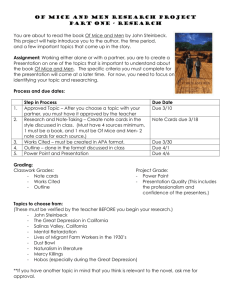
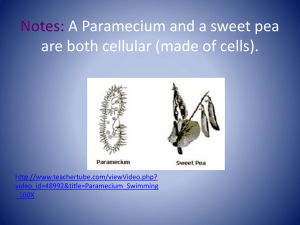
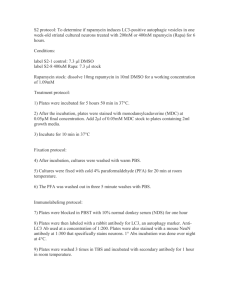

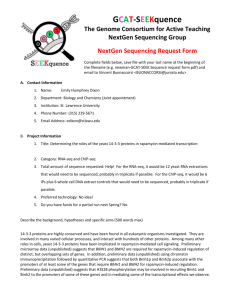
![Historical_politcal_background_(intro)[1]](http://s2.studylib.net/store/data/005222460_1-479b8dcb7799e13bea2e28f4fa4bf82a-300x300.png)
